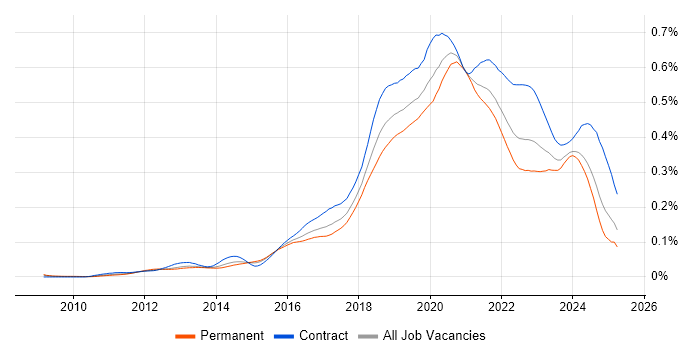Microsoft Azure Developer
UK > England
The median Microsoft Azure Developer salary in England is £63,000 per year, according to job vacancies posted during the 6 months leading to 4 May 2025.
The table below provides salary benchmarking and summary statistics, comparing them to the same period in the previous two years.
| 6 months to 4 May 2025 |
Same period 2024 | Same period 2023 | |
|---|---|---|---|
| Rank | 616 | 553 | 679 |
| Rank change year-on-year | -63 | +126 | -12 |
| Permanent jobs requiring an Azure Developer | 45 | 296 | 256 |
| As % of all permanent jobs advertised in England | 0.097% | 0.35% | 0.28% |
| As % of the Job Titles category | 0.11% | 0.37% | 0.30% |
| Number of salaries quoted | 39 | 153 | 246 |
| 10th Percentile | £51,000 | £46,700 | £51,250 |
| 25th Percentile | £56,250 | £52,500 | £55,000 |
| Median annual salary (50th Percentile) | £63,000 | £61,500 | £68,750 |
| Median % change year-on-year | +2.44% | -10.55% | +10.00% |
| 75th Percentile | £76,875 | £80,000 | £87,500 |
| 90th Percentile | £97,500 | £99,000 | £110,000 |
| UK median annual salary | £64,000 | £60,000 | £67,500 |
| % change year-on-year | +6.67% | -11.11% | +10.66% |
All Permanent IT Job Vacancies
England
For comparison with the information above, the following table provides summary statistics for all permanent IT job vacancies in England. Most job vacancies include a discernible job title that can be normalized. As such, the figures in the second row provide an indication of the number of permanent jobs in our overall sample.
| Permanent vacancies in England with a recognized job title | 42,028 | 80,606 | 84,581 |
| % of permanent jobs with a recognized job title | 90.33% | 94.48% | 91.54% |
| Number of salaries quoted | 24,667 | 60,286 | 53,585 |
| 10th Percentile | £30,000 | £28,500 | £32,500 |
| 25th Percentile | £42,435 | £38,250 | £45,000 |
| Median annual salary (50th Percentile) | £57,500 | £53,500 | £60,800 |
| Median % change year-on-year | +7.48% | -12.01% | +1.33% |
| 75th Percentile | £75,000 | £71,991 | £82,500 |
| 90th Percentile | £97,500 | £91,250 | £100,000 |
| UK median annual salary | £57,500 | £52,550 | £60,000 |
| % change year-on-year | +9.42% | -12.42% | - |
Azure Developer
Job Vacancy Trend in England
Job postings that featured Azure Developer in the job title as a proportion of all IT jobs advertised in England.

Azure Developer
Salary Trend in England
3-month moving average salary quoted in jobs citing Azure Developer in England.
Azure Developer
Salary Histogram in England
Salary distribution for jobs citing Azure Developer in England over the 6 months to 4 May 2025.
Azure Developer
Job Locations in England
The table below looks at the demand and provides a guide to the median salaries quoted in IT jobs citing Azure Developer within the England region over the 6 months to 4 May 2025. The 'Rank Change' column provides an indication of the change in demand within each location based on the same 6 month period last year.
| Location | Rank Change on Same Period Last Year |
Matching Permanent IT Job Ads |
Median Salary Past 6 Months |
Median Salary % Change on Same Period Last Year |
Live Jobs |
|---|---|---|---|---|---|
| London | +73 | 21 | £72,500 | -19.44% | 17 |
| South East | +8 | 14 | £62,750 | -3.46% | 9 |
| North of England | +4 | 6 | £60,000 | +4.35% | 6 |
| Yorkshire | +73 | 4 | £60,000 | -7.69% | 1 |
| Midlands | +37 | 4 | £60,000 | +9.09% | 3 |
| West Midlands | +41 | 3 | £60,000 | +9.09% | 1 |
| North West | -37 | 2 | £69,250 | +35.78% | 2 |
| East Midlands | +30 | 1 | £52,500 | +5.00% | 2 |
| Azure Developer UK |
|||||
Azure Developer Skill Set
Top 30 Co-occurring Skills and Capabilities in England
For the 6 months to 4 May 2025, Azure Developer job roles required the following skills and capabilities in order of popularity. The figures indicate the absolute number co-occurrences and as a proportion of all permanent job ads across the England region featuring Azure Developer in the job title.
|
|
Azure Developer Skill Set
Co-occurring Skills and Capabilities in England by Category
The follow tables expand on the table above by listing co-occurrences grouped by category. The same employment type, locality and period is covered with up to 20 co-occurrences shown in each of the following categories:
|
|
|||||||||||||||||||||||||||||||||||||||||||||||||||||||||||||||||||||||||||||||||||||||||||||
|
|
|||||||||||||||||||||||||||||||||||||||||||||||||||||||||||||||||||||||||||||||||||||||||||||
|
|
|||||||||||||||||||||||||||||||||||||||||||||||||||||||||||||||||||||||||||||||||||||||||||||
|
|
|||||||||||||||||||||||||||||||||||||||||||||||||||||||||||||||||||||||||||||||||||||||||||||
|
|
|||||||||||||||||||||||||||||||||||||||||||||||||||||||||||||||||||||||||||||||||||||||||||||
|
|
|||||||||||||||||||||||||||||||||||||||||||||||||||||||||||||||||||||||||||||||||||||||||||||
|
|
|||||||||||||||||||||||||||||||||||||||||||||||||||||||||||||||||||||||||||||||||||||||||||||
|
|
|||||||||||||||||||||||||||||||||||||||||||||||||||||||||||||||||||||||||||||||||||||||||||||
|
||||||||||||||||||||||||||||||||||||||||||||||||||||||||||||||||||||||||||||||||||||||||||||||
